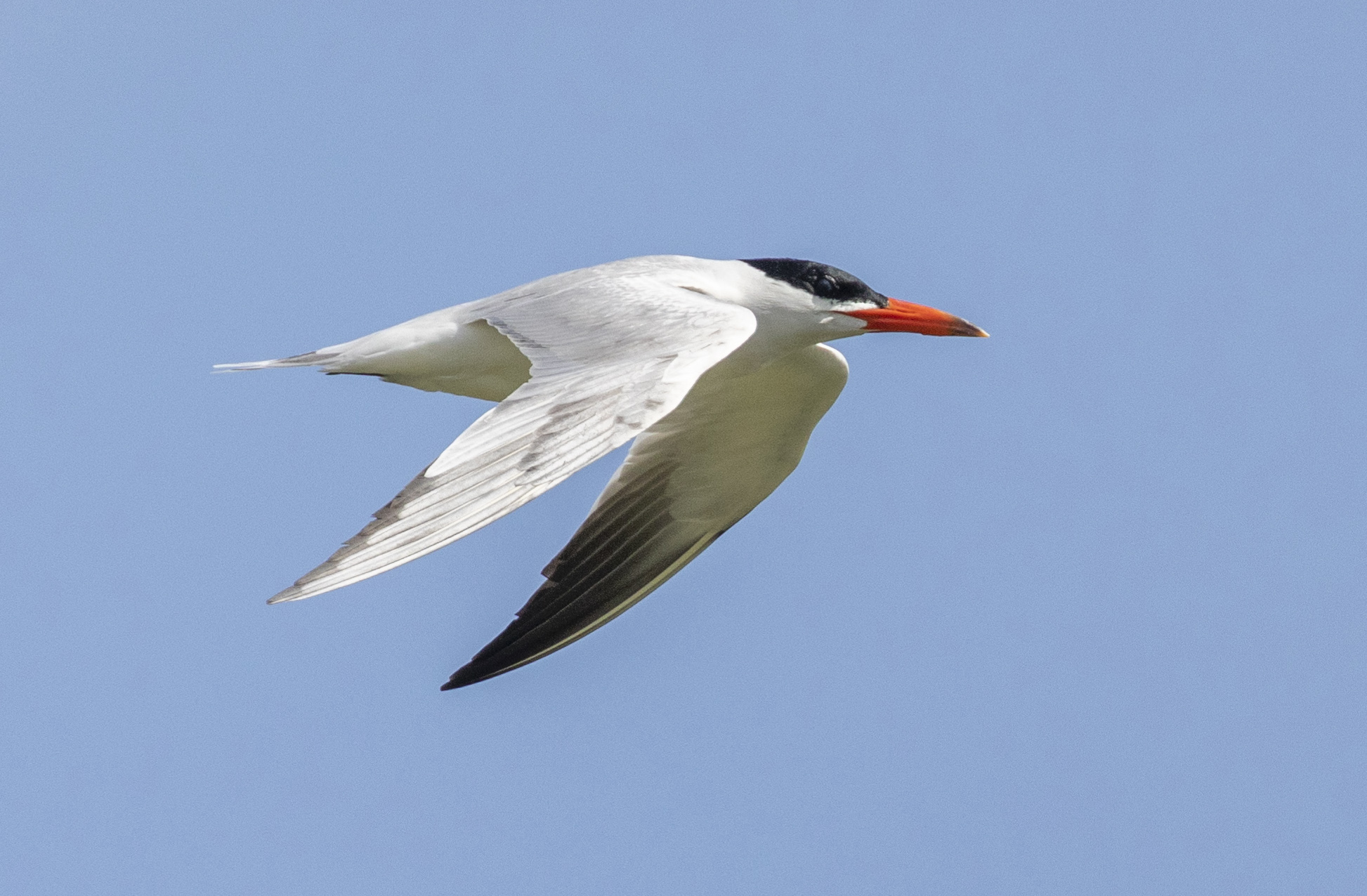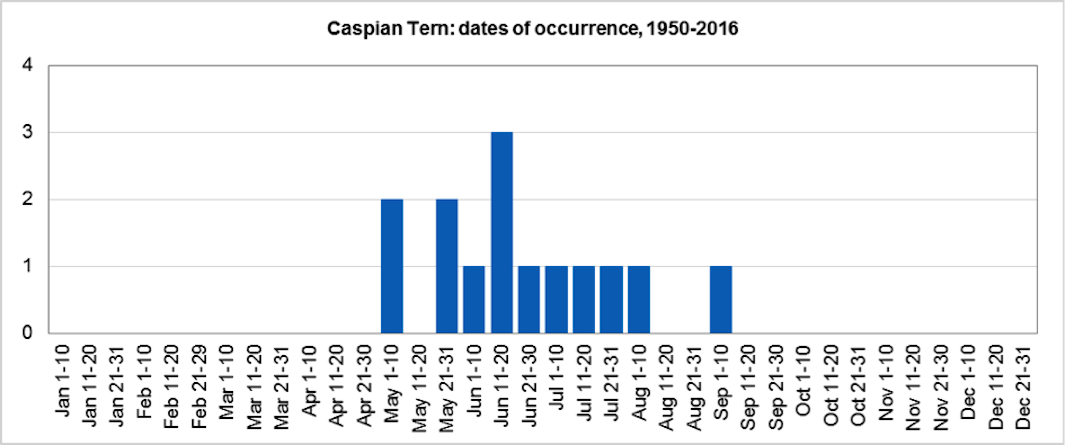Caspian Tern Hydroprogne caspia
Vagrant. Western Europe.

Caspian Tern July at Frampton Marsh 2020 (Graham Catley).
There is one historic record of a bird predictably shot at Caythorpe, Grantham on May 17th, 1853. The next was not until September 5th, 1971 at Gibraltar Point and since then there have been another 16 records involving about 12 birds; the two birds in Jul 1979 are regarded as separate individuals. In Jun 2016 the two birds at Gibraltar Point were the first and only time there have been two together. One of these two carried a metal ring on the right leg although no details could be read. The bird in 2020 was present on and off for 12 days at Frampton Marsh but was absent for lengthy spells and was assumed to have been the same bird briefly seen at Huttoft Pit LWT Reserve on July 14th. Those in 2021 might have been dismissed as one individual had not some astute field observation, coupled with examination of photographs, noted colour rings on different legs and plumage differences in the second bird indicating that it was an immature bird.
There are five recoveries of foreign-ringed Caspian Terns in Britain, one from America (1939), three from Sweden (1976, two in 2019) and one from Finland (1972). The two in 2019 were colour-ringed and had been ringed as nestlings, one in 2015 and one in 2016 but both seen together in Devon. Clearly Scandinavian colonies are most likely to be the source of Lincolnshire records.
| Site | First date | Last date | Count | Notes |
| Caythorpe | 17/05/1853 | - | 1 | Shot |
| Gibraltar Point NNR | 05/09/1971 | - | 1 | |
| Messingham SQ | 04/07/1979 | - | 1 | Adult |
| Donna Nook | 14/07/1979 | - | 1 | One flew north |
| Messingham SQ | 14/07/1981 | - | 1 | |
| South Ferriby | 15/07/1981 | 16/07/1981 | 1 | Assumed same bird as at Messingham SQ on 14th |
| Spalding | 05/07/1988 | - | 1 | Fishing the Coronation Channel. Also seen in Rutland, Warwickshire and Cheshire. |
| North Hykeham and Thorpe Hill | 08/05/1988 | - | 1 | Same as Spalding bird |
| Torksey | 06/06/1989 | - | 1 | On R Trent, flew in from Nottinghamshire |
| Messingham SQ | 23/06/1992 | - | 1 | |
| Boultham Mere | 10/08/2002 | - | 1 | |
| Norh Hykeham | 10/08/2002 | - | 1 | Same as Boultham Mere bird |
| Freiston Shore | 22/05/2009 | - | 1 | |
| Gibraltar Point NNR | 30/05/2015 | - | 1 | |
| Middlemarsh Farm, Skegness | 13/06/2016 | 15/06/2016 | 1 | |
| Gibraltar Point NNR | 14/06/2016 | 18/06/2016 | 2 | Both 3CY+ birds, one presumed same as Middlemarsh bird. |
| Gibraltar Point NNR | 19/06/2016 | - | 1 | One of the two at Gibraltar Point 14th-16th. |
| Alkborough Flats | 24/07/2016 | - | 1 | Same bird as in Yorkshire. |
| Baston and Langtoft GP | 15/07/2017 | 16/07/2017 | 1 | 3CY+ |
| Frampton Marsh | 10/07/2020 | 21/07/2020 | 1 | |
| Huttoft Pit LWT reserve | 14/07/2020 | - | 1 | Visited briefly, assumed same as Frampton Marsh bird. |
| Barton Sailing Pit | 19/06/2021 | - | 1 | Adult |
| Baston and Langtoft GP | 19/06/2021 | 20/06/2021 | 1 | |
| Barton Sailing Pit | 25/06/2021 | 28/06/2021 | 1 | Immature bird, different from adult of 19/06/2021. |
| Wolla Bank | 26/07/2022 | - | 1 | Flew S at 08:05 at c.300 yards along the tide edge at about 20’ over the water. |
| Baston GP | 08/06/2023 | - | 1 | 3CY+ - note that all of the 2023 records could refer to the same individual. |
| Gibraltar Point | 06/07/2023 | - | 1 | 3CY+ |
| Saltfleetby-Theddlethorpe NNR | 10/07/2023 | - | 1 | 3CY+ |
| Toft Newton Reservoir | 31/07/2023 | - | 1 | 3CY+ |
| RAF Woodhall LWT Reserve | 29/08/2023 | - | 1 | 3CY+ |
| Far Ings NR | 26/06/2024 | - | 1 | 3CY |

Finder’s report: Caspian Tern, Gibraltar Point NNR, September 5th, 1971.
by C. C. Brown, I. Lamb, and N. R. Stocks
Note: account based on the original BBRC submissions and some correspondence therein; this was the second county record. The BBRC report on rare birds in 1971 noted that the total number of British and Irish records had increased to 90, with more than half since 1958.
Circumstances
On a very clear afternoon in good light, we saw a Caspian Tern swimming on a tidal shallow on the spit at Gibraltar Point NNR in the company of a Black-headed Gull and it was considerably larger and stouter than that species. It took to flight and landed near to a flock of immature and adult Lesser Black-backed Gulls.
Description
In size it seemed only a little smaller than the Lesser Black-backed Gulls. It was approached to within 10 yards where we had good views of the head which was black on the crown with a prominent crest. The heavy red bill could also be clearly seen. The general appearance was of a large greyish-white tern with long wings and a white, forked tail, and very noticeable red legs.
As it took flight black undersides to the primaries could be seen; the flight was slow, with heavy wing beats quite unlike the flight of the much smaller Sandwich Terns nearby. It flew out to sea and was last seen fishing; despite waiting for another half an hour it was lost to sight.
Reference
Smith, F. R., and the Rarities Committee (1972). Report on rare birds in Great Britain in 1971 (with 1967, 1968, 1969 and 1970 additions). British Birds 65 (8): 322-354.
(Account prepared October 2017, updated September 2022 with reference to the new Birds of Lincolnshire (2021))

